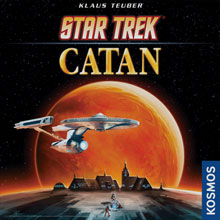Ah, Settlers of Catan. It is in so many ways the gateway game, introducing unsuspecting people everywhere to the new world of modern board games. It mixes the right features that are simple enough to pick up: you compete with your opponents but do not directly attack them. Instead, you race to gather resources and expand your little colony, all the while keeping distance between yourself and the other players. I rarely meet anyone who does not enjoy the game after first playing or someone who objects to playing it again.
Since its original release in 1995, Settlers has seen many rule variants from people eagerly looking to tweak its modest gameplay, and the publishers have noticed. For example, the classic game takes place on a large island. Many players started breaking the mainland into small island chains for a varied game experience. The style became so popular that in 1997, Seafarers of Catan was released, making the variant an official expansion. In 1999, 5-6 player expansions were released to allow more people to get in on the same game. For those who relished the idea of militarizing their little island, Cities and Knight of Catan introduced a new mechanic that provided knights to defend your settlements from barbarians.
We now have historical Catan, space Catan, Atlantis Catan, Star Trek Catan…

To boldly go where no sheep has gone before.
Yet for all these expansions, variations remain popular. If you enjoy playing on the islands well enough, then Seafarers is a good investment. But there is so much tweaking you can do with just the base game, if you feel the need.
Most variants people tend to play seem to revolve around the robber. A simple one one I’ve personally tried is adding a second robber, which lets players keep someone with a strong lead in check. It definitely adds to the table-politics – especially when your wife talks said table into keeping said robbers on your land…
Other “Robber Rules” involve placing him on territories with ports to shut them down, or even placing him on players themselves to stop them from playing developments. (I personally disliked the latter. Slowing down someone’s production isn’t the same as stopping them cold.)
Cosmic Settlers
For a really new experience, try Cosmic Settlers. It plays the same as the base game, but each player gets one of the powers listed below. Some friends of mine discovered it online a while back, and while some of the abilities listed below seem a little powerful (or weak), it all evens out. With special thanks to Craig O’Brien for compiling this list (and other Catan variants), the Cosmic powers include:
Amoeba: You have the power to ooze. On your turn, you may move one of your roads to an adjacent edge, much like in Seafarers. Alternatively, you may move a settlement or city along your roads one step a turn, as long as the new spot is a legal space.
Calculator: You have the power to equalize. On your turn, you may switch one of the dice results to be the same as the other die.
Chronos: You have the power of time travel. On your turn, you may replace the roll of the dice with either of the last two player’s rolls.
Clone: You have the power to copy. When building a city or town, you may keep one of the resources used instead of discarding it.
Filch: You have the power of theft. You may steal two cards when moving the robber, from one or two opponents (they still both must be on the robber’s new hex).
Insect: You have the power of metamorphosis. On each of your turns, before doing anything, you can pick a power of any player sharing a hex with you. You keep that power until your next turn.
Miser: You have the power to hoard. You only have to discard on a 7 if you have more than 10 cards.
Pirate: You have the power of smuggling. You may produce even when the robber is on your hex, but no more than one such production each turn. You also choose which card to give to the robber.
Trader: You have the power of transference. You can trade 3 for 1 without a port.
Vulch: You have the power of salvage. Whenever someone discards due to the robber, you may pick up half of those cards and put them in your hand.
Wave: You have the power of nudging. On your turn you may change the sum of the dice up or down one.
Will: You have the power of choice. On your turn you may pick the result of one die, and then roll the other.
Worm: You have the power to tunnel. Whenever the robber is placed on a space, after any cards are stolen, you may move the robber to a different space. It cannot go to the desert or back to where it was, and both spaces must have a common player.
Every time I’ve played with these powers have been a blast! It surprisingly doesn’t alter the feel of the game much at all, and besides, a little megalomania can spice your game right up!
Two-Player Catan
At the time of this writing, there are no official two-player rules for Settlers, which is a shame. It’s my wife’s favorite game, and we usually can’t play without anyone else. So where do we turn? Variants! There are several that add a neutral third player, but the one I’ve found that seems to work the best keeps it at two:
- As two opponents won’t be doing much trading with each other, they roll the dice twice on their turns, collecting resources on both rolls.
- The robber is controlled by the player with the fewest Victory Points.
- The Victory Points necessary to win the game are raised to 12.
- The hand limit is increased from 7 to 9.
I’d love to hear the results of people trying these and other variants out. Or better, if you’ve varied your own rules, feel free to share!

We’re still working on a Princess Bride variant. Dread Pirate Roberts as the Robber?
![]()
Nathan Crocco is a regular contributor to the site. If you have particular game variants you wish to request of him, he can be reached at nathan@cardboardrepublic.com.
You can discuss this article over on our forums!
